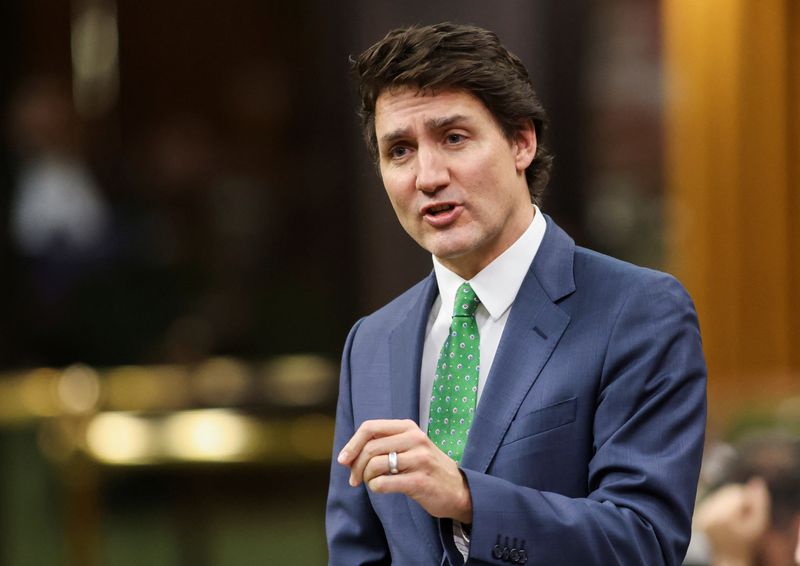By Steve Scherer and Nia Williams
OTTAWA (Reuters) - Canada's 2023 budget took a big step toward luring more investment in clean technology to build a low-carbon economy, analysts said on Wednesday, but gaps must still be filled to make the country more competitive with the United States.
Liberal Prime Minister Justin Trudeau's government unveiled on Tuesday a series of new green investment tax credits worth some C$35 billion ($26 billion) on Tuesday, including almost C$26 billion for producing and transmitting electricity.
"Given the role that electricity is going to play in the decarbonisation of the Canadian economy, this is probably the most important federal budget ever for addressing climate change," said Francis Bradley, the chief executive of trade association Electricity Canada.
Before the budget, Canada was "in neutral", Bradley said. "This puts us right up into second gear."
Trudeau's government has been under pressure to level the playing field with its largest trading partner since Washington passed massive uncapped incentives for clean energy investments in the Inflation Reduction Act (IRA) last year.
While the budget makes headway on the green transition, it does not put the kind of money on the table the United States has, said Michael Bernstein, executive director of climate think-tank Clean Prosperity. The IRA could offer more than $1 trillion to clean tech investors there.
Canada's investment tax credits help companies make one-time capital expenditures, but the U.S. is offering ongoing production tax credits that cover operational costs.
"It is going to continue to be difficult to compete with the U.S. without production tax credits," Bernstein said. For hydrogen, investment tax credits will not be enough "to keep us competitive with the U.S."
Mark Zacharias, executive director for Clean Energy Canada, agreed.
"Our suggestion for future budgets is we'd like to see production tax credits for electricity, batteries and clean hydrogen," said Zacharias.
The new tax credits will have broad appeal to investors in new and growing industries, ranging from clean hydrogen, to zero-emissions vehicle manufacturing, to heat pumps.
"The government is mobilizing private investment into new sources of economic growth," said Dale Beugin, executive vice president of the Canadian Climate Institute.
Industry groups and analysts said Canada still needs to do more to develop contracts for differences, which are meant to encourage major projects in carbon capture or hydrogen production. Contracts for differences guarantee investors in such projects a fixed carbon or hydrogen price over a contract duration, guarding against risks from political and market uncertainty.
The budget detailed how Canada will set up a growth fund, or a public investment vehicle, that a government source said would provide the contracts for projects it finances. Ottawa is still consulting on how to set up a program that would offer the contracts more broadly.
Canada also widened eligibility for previously-announced carbon capture utilization and storage (CCUS) investment tax credits to include cement plants.
That will benefit a proposed C$1.4 billion net-zero cement plant in Edmonton Alberta, being developed by privately-owned Lehigh Cement. Pipeline company Enbridge Inc (TSX:ENB) is working with Lehigh to develop the CCUS component.

"From my industry's perspective, we are very pleased," said Sarah Petrevan, sustainability director for the Cement Association of Canada. "This budget far exceeded my expectations in how targeted the government was going to be."
($1 = 1.3584 Canadian dollars)